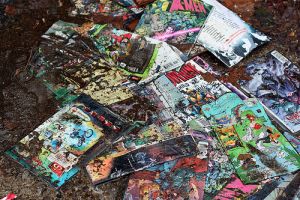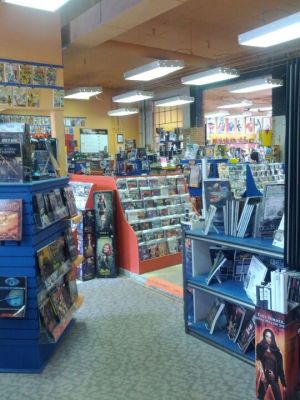Comics /
Spotlight /
Knowledge and Scholarship
Top 5 Elements of a Great Comic Book Store
By Zak Edwards
September 5, 2012 - 13:40
For many of us comic book fans going to the comic store is a weekly event and is probably one of the more frequently visited places we go to other than (hopefully) the grocery store. I mean, think about it, we go there weekly, that is quite often. We get to know the people behind the counter, they get to know us. I, for years, went every week to the same store, an award-winning store called Happy Harbor Comics in Edmonton, Canada, almost every week, and it pained me to leave them behind as I left for grad school last month. The staff there were wonderful, the location perfect even as they moved around, and they were heavily involved in the community, both in terms of gathering artists and fans together and planning events and opportunities for their customers to do some fundraising for local charities. It was the single best comic store I had ever walked into and I got to do it every week. But now, as I have settled into life across the country, I am faced with the overwhelming prospect of trying to find a new store with new people but still with some of what I left behind.
So I thought I would write about, and hopefully get some feedback in the comment section below, about what constitutes a good comic book store. Feel free to fill the comments below with important factors, shout-outs to great stores, and good experiences you’ve had in these stores who fuel a great medium and a great hobby. For me, I’ve come up with five key things I’ll be looking for in my search today (it is new comic book day after all, what better time?):
1. Location, Location, Location.
It’s unfortunate, but this is a huge factor. If I want to pick up some funny books every week, I would prefer to keep the pilgrimage metaphorical rather than feeling like it would just be easier to go to Mecca and back. I don’t own a car, so the store has to be somewhere I can either walk to or bus to that isn’t really far out of the usual routes I’ll be going. My last store was a ten minute walk from my doorstep, most of the way along a nice path by a park, which made it even better, so that was ideal.
 |
2. People People
I think we all have horror stories of the staff we’ve had to deal with while actively trying to give them money; people who have no business sense, no drive, and, worst of all, no people skills. It’s unfortunate, but The Comic Book Guy on The Simpsons works well as a character because he embodies a stereotype we’ve all encountered, that person who berates you, is more interested in cruising the internet instead of helping you, and is even exploits their customers because they don’t care about good service or making a positive experience. Walking into a store that has people who you like talking to is extremely important, I enjoy putting my money into things I want to support and it’s nice if they reciprocate by treating me like a human being and actually get off their butt to help me. A people person is essential to attracting customers and creating good customer relations. Happy Harbor Comics has some of the best staff in the world, they always addressed me by my name, always kept me around for chats about all sorts of topics, and turned me onto books and creators I loved by getting to know me and suggesting things accordingly. It was great and I think that’s important.
3. A Decent File Program
Almost every store has a file system, a box they keep for you where they put aside comics for you, and it usually comes with some incentives for the guaranteed business. Now, free bags and boards is nice and all, but I like something better that also works better. A system that lets you drop titles and add them just as easy without having to fill out paperwork or talk to the right person is ideal, with easy access (maybe even online access) to what you are getting making it even better. Discounts on product goes a long way too, especially if it’s on product you actually buy. Looking at stores online, I’ve found lots offer discounts to file customers, but sometimes those discounts are on everything but the single issues themselves, from only statues/ action figures to just back issues. That, to me, is hardly an incentive. That being said, file incentives aren’t as important as the store itself and the people in it.
4. Presentation (ie. Broom, Paint, and Dust Cloth, Heard of ‘Em?)
It seems every comic store I walk into has a different way of organizing the thousands of products lining their shelves and it makes it impossible to find things. I want a store that has things laid out in a way that makes sense in an environment that doesn’t feel like I walked into someone’s unfinished basement. It’s a business after all, try to look like a place I want to walk into and buy something. Even better, keeping things looking and operating smoothly. I hate when I walk into a comic store, try to find something, and then ask where it is, only to have the clerk themselves have no idea. A record of their product is even better and with programs like Excel existing for years now, it actually isn’t even difficult to set up and maintain product databases (or to take that database online as well, something Happy Harbor had that I used all the time). So a store that’s arranged logically (all the new comics on the same rack in alphabetical order is my top priority) and actually looks like it receives tender loving care means I won’t dread walking in and may actually buy more stuff, good for the store and great for me.
5. Community
One thing that Happy Harbor Comics did so very well, and one of the things that defined it, was how it took advantage of the community of comic enthusiasts by getting them together for various events and purposes. They had a large space dedicated to movie nights, showing anything from seasons of The Guild to old Kung Fu films, with entrance being a food bank donation. Other events included author signings (rare given the location, but in earnest), weekly gatherings for local artists, and even the occasional call out for collections of comics by local creators (they are called Tales From the Harbor and I wrote a short story for one of them). Other things included drives for local charities, weekly nacho nights at a bar for general hanging out, and school programs to get kids interested in reading and writing through the use of comics. Happy Harbor tried to make the store more than just a place to buy things, a place where people could gather to express themselves, meet others like them, and become a positive place for the city as well. As almost all comic stores are local businesses, I’m surprised more don’t embrace that and try to be part of the community the way independent theatres, cafes, and other types of businesses do.
So those are my five main things for selecting a store and I will be hunting this week for exactly that, using the Comic Book Bin’s app to find them, of course! For those of you who don’t know, the Comic Book Bin has a great app that lets you, among other great things, find local comic book stores and even conventions in your area! And it’s available on Android, webOS, and IOS.
How about you guys? What makes a comic store great? Are there stores out there that just totally made your day, or at least gave you a funny story as to why you will never go back? Let us know in the comments section below.
Last Updated: January 17, 2025 - 08:20

